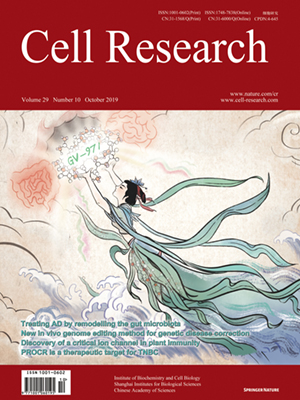
Volume 29, No 10, Oct 2019
ISSN: 1001-0602
EISSN: 1748-7838 2018
impact factor 17.848*
(Clarivate Analytics, 2019)
Volume 29 Issue 10, October 2019: 787-803 | Open Access
ORIGINAL ARTICLES
Sodium oligomannate therapeutically remodels gut microbiota and suppresses gut bacterial amino acids-shaped neuroinflammation to inhibit Alzheimer’s disease progression
Xinyi Wang1, Guangqiang Sun1, Teng Feng1, Jing Zhang1, Xun Huang2, Tao Wang3, Zuoquan Xie2, Xingkun Chu1, Jun Yang1,Huan Wang2, Shuaishuai Chang1, Yanxue Gong1, Lingfei Ruan1, Guanqun Zhang1, Siyuan Yan1, Wen Lian1, Chen Du1, Dabing Yang1,Qingli Zhang4, Feifei Lin4, Jia Liu4, Haiyan Zhang2, Changrong Ge1, Shifu Xiao3, Jian Ding2 and Meiyu Geng2
1Shanghai Green Valley Pharmaceutical Co., Ltd, Shanghai 201203, China; 2State Key Laboratory of Drug Research, Shanghai Institute of Materia Medica, Chinese Academy of Sciences, Shanghai 201203, China; 3 Department of Geriatric Psychiatry, Shanghai Mental Health Center, Shanghai Jiao Tong University School of Medicine; Alzheimer’s Disease and Related Disorders Center, Shanghai Jiao Tong University, Shanghai 200025, China and 4Institutional Technology Service Center, Shanghai Institute of Materia Medica, Chinese Academy of Sciences, Shanghai 201203, China
Correspondence: Meiyu Geng (mygeng@simm.ac.cn)These authors contributed equally: Xun Huang, Tao Wang, Zuoquan XieThese authors contributed equally as co-first authors: Xinyi Wang, Guangqiang Sun, Teng Feng, Jing Zhang
Recently, increasing evidence has suggested the association between gut dysbiosis and Alzheimer’s disease (AD) progression, yet the role of gut microbiota in AD pathogenesis remains obscure. Herein, we provide a potential mechanistic link between gut microbiota dysbiosis and neuroinflammation in AD progression. Using AD mouse models, we discovered that, during AD progression, the alteration of gut microbiota composition leads to the peripheral accumulation of phenylalanine and isoleucine, which stimulates the differentiation and proliferation of pro-inflammatory T helper 1 (Th1) cells. The brain-infiltrated peripheral Th1 immune cells are associated with the M1 microglia activation, contributing to AD-associated neuroinflammation. Importantly, the elevation of phenylalanine and isoleucine concentrations and the increase of Th1 cell frequency in the blood were also observed in two small independent cohorts of patients with mild cognitive impairment (MCI) due to AD. Furthermore, GV-971, a sodium oligomannate that has demonstrated solid and consistent cognition improvement in a phase 3 clinical trial in China, suppresses gut dysbiosis and the associated phenylalanine/isoleucine accumulation, harnesses neuroinflammation and reverses the cognition impairment. Together, our findings highlight the role of gut dysbiosis-promoted neuroinflammation in AD progression and suggest a novel strategy for AD therapy by remodelling the gut microbiota.
https://doi.org/10.1038/s41422-019-0216-x
FULL TEXT | PDF
Browse 1388


